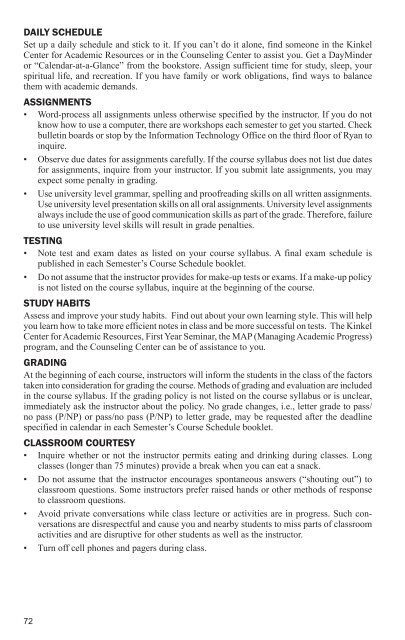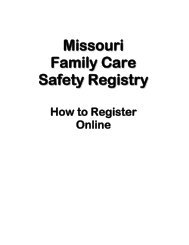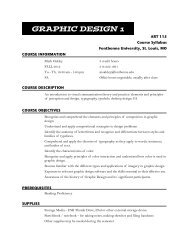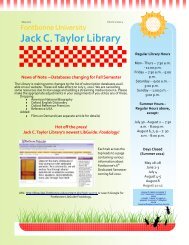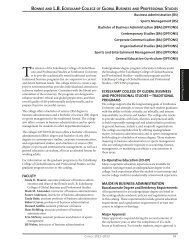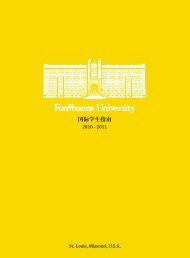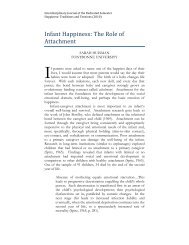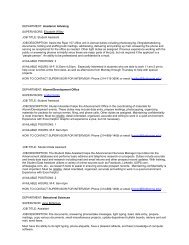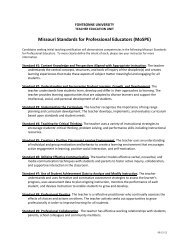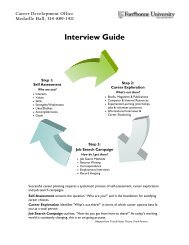Click here (pdf, 891.09KB) - Fontbonne University
Click here (pdf, 891.09KB) - Fontbonne University
Click here (pdf, 891.09KB) - Fontbonne University
Create successful ePaper yourself
Turn your PDF publications into a flip-book with our unique Google optimized e-Paper software.
dAily sChedule<br />
Set up a daily schedule and stick to it. If you can’t do it alone, find someone in the Kinkel<br />
Center for Academic Resources or in the Counseling Center to assist you. Get a DayMinder<br />
or “Calendar-at-a-Glance” from the bookstore. Assign sufficient time for study, sleep, your<br />
spiritual life, and recreation. If you have family or work obligations, find ways to balance<br />
them with academic demands.<br />
AssiGnMents<br />
• Word-process all assignments unless otherwise specified by the instructor. If you do not<br />
know how to use a computer, t<strong>here</strong> are workshops each semester to get you started. Check<br />
bulletin boards or stop by the Information Technology Office on the third floor of Ryan to<br />
inquire.<br />
• Observe due dates for assignments carefully. If the course syllabus does not list due dates<br />
for assignments, inquire from your instructor. If you submit late assignments, you may<br />
expect some penalty in grading.<br />
• Use university level grammar, spelling and proofreading skills on all written assignments.<br />
Use university level presentation skills on all oral assignments. <strong>University</strong> level assignments<br />
always include the use of good communication skills as part of the grade. T<strong>here</strong>fore, failure<br />
to use university level skills will result in grade penalties.<br />
testinG<br />
• Note test and exam dates as listed on your course syllabus. A final exam schedule is<br />
published in each Semester’s Course Schedule booklet.<br />
• Do not assume that the instructor provides for make-up tests or exams. If a make-up policy<br />
is not listed on the course syllabus, inquire at the beginning of the course.<br />
study hAbits<br />
Assess and improve your study habits. Find out about your own learning style. This will help<br />
you learn how to take more efficient notes in class and be more successful on tests. The Kinkel<br />
Center for Academic Resources, First Year Seminar, the MAP (Managing Academic Progress)<br />
program, and the Counseling Center can be of assistance to you.<br />
GrAdinG<br />
At the beginning of each course, instructors will inform the students in the class of the factors<br />
taken into consideration for grading the course. Methods of grading and evaluation are included<br />
in the course syllabus. If the grading policy is not listed on the course syllabus or is unclear,<br />
immediately ask the instructor about the policy. No grade changes, i.e., letter grade to pass/<br />
no pass (P/NP) or pass/no pass (P/NP) to letter grade, may be requested after the deadline<br />
specified in calendar in each Semester’s Course Schedule booklet.<br />
ClAssrooM Courtesy<br />
• Inquire whether or not the instructor permits eating and drinking during classes. Long<br />
classes (longer than 75 minutes) provide a break when you can eat a snack.<br />
• Do not assume that the instructor encourages spontaneous answers (“shouting out”) to<br />
classroom questions. Some instructors prefer raised hands or other methods of response<br />
to classroom questions.<br />
• Avoid private conversations while class lecture or activities are in progress. Such conversations<br />
are disrespectful and cause you and nearby students to miss parts of classroom<br />
activities and are disruptive for other students as well as the instructor.<br />
• Turn off cell phones and pagers during class.<br />
iMportAnt doCuMents<br />
• Obtain a current <strong>Fontbonne</strong> <strong>University</strong> Catalog when you begin at <strong>Fontbonne</strong>. This will<br />
be the catalog which governs your degree requirements, even if a new catalog is published<br />
while you are in school. Read and assume responsibility for the statement in the catalog<br />
under “Academic Policies and Regulations” entitled “Student Responsibilities”.<br />
• Keep your catalog and course syllabi even after you graduate or withdraw from <strong>Fontbonne</strong>.<br />
If you wish to attend another school at a later date, the officials of that school may seek<br />
detailed information about your courses or degree. The catalog and syllabi will supply this<br />
information.<br />
• Obtain a <strong>Fontbonne</strong> Course Schedule booklet each semester and keep it until your graduate.<br />
Besides the current course listings, the Course Schedule booklet lists the semester calendar,<br />
deadlines, the exam schedule, e-mail address information, costs and other important<br />
information particular to a given semester.<br />
• Obtain a student handbook (Griffin Scratch) each year. Some regulations in the handbook<br />
may change from year to year. Each year is governed by the rules and regulations of the<br />
current student handbook.<br />
ForMs<br />
Recognize that you will need to complete a number of specialized forms as you progress<br />
through <strong>Fontbonne</strong> <strong>University</strong>, for example, a major approval form, approval for teacher<br />
certification, permission to study at another institution, or application for graduation. Obtain<br />
the necessary forms from the registrar’s office, complete all information requested, including<br />
all required signatures in the order presented on the form, and return forms immediately to<br />
the registrar’s office.<br />
online ClAsses<br />
• Before your first online class at <strong>Fontbonne</strong> <strong>University</strong>, you must complete the Blackboard<br />
tutorial (FOC 101) or you will not have access to your other classes<br />
• Set aside specific times to work on your online class; you should allot the number of credit<br />
hours of the course plus 2-3 hours per credit hour each week. If the course is an eight week<br />
course, double the number of hours! Example: 3 credit hour class for 16 weeks= 9- 12<br />
hours per week of study; 3 credit hour class for 8 weeks= 18- 24 hours per week of study.<br />
• Read all your class materials thoroughly<br />
• Stay in contact with your instructor<br />
• Ask for the help you need from your instructor, from the library, from the Kinkel Center<br />
and from IT<br />
WithdrAWAl FroM A Course<br />
Students who, with proper authorization, withdraw from a course before the date specified<br />
in the semester course schedule receive a grade of W. The request for withdrawal will not be<br />
accepted after the deadline specified in the Semester Course Schedule booklet.<br />
72 73


